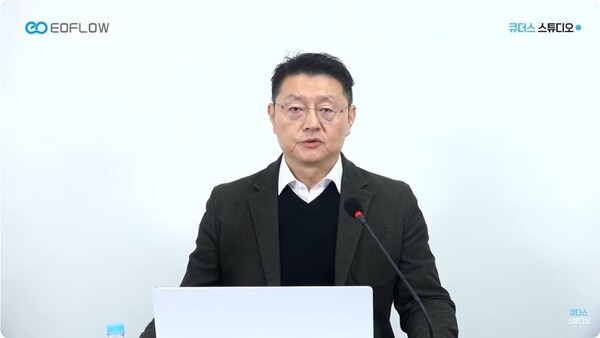Kim Jae-jin, founder and CEO of wearable insulin pump maker EOFlow, has expressed his positions on the background of the abortive acquisition of Medtronic, future business plans, and response to the lawsuit with Insulet.
EOFlow held an online IR briefing on Monday, in which CEO Kim answered shareholders' questions.

"Until now, we had a strict confidentiality clause in our contract with Medtronic, so there were a lot of things we couldn't say even if we wanted to," Kim said. "Like it or not, the contract terminated, and we are now relatively free from that to answer shareholders' questions."
Commenting on the sharp decline in the stock price after the Medtronic acquisition collapsed, Kim said, "The shareholder composition has changed a lot since we announced the share purchase agreement with Medtronic in May. When the tender offer price was announced at 30,000 won ($22.8), and the stock price remained in the low 20,000s, many individual investors exited, while many institutional investors came in expecting an M&A.”
Following the contract termination, the stock price fell more than anticipated, primarily due to the exit of institutional investors. Still, fortunately, Kim noted that there has been a lot of volume trading since last week.
"I think the stock price will be better defended in the future," he said.
CEO Kim did not elaborate on the reasons for terminating the acquisition agreement with Medtronic but explained that the two companies still view each other positively.
"The acquisition agreement with Medtronic was terminated last Thursday. The two companies agreed not to disclose the reason for the termination or the costs due to its termination,” he said. "It is true that the termination of the contract means that there was a difference of opinion between the two companies in some ways."
Stressing that the termination of the agreement does not mean that the two sides have ceased to be interested in each other, Kim said, “Both companies remain interested in each other, and Medtronic will continue to monitor Insulet’s litigation. We are both committed to the ultimate success of this agreement, which has also been agreed upon with Medtronic's diabetes unit.”
Kim also addressed the intellectual property lawsuit against Insulet, which is believed to have been the main reason for the termination of the Medtronic deal.
"The lawsuit is about trade secrets. Insulet claims we are developing or producing products by stealing its trade secrets. It makes this claim based on circumstantial evidence, such as that some of its consultants are former Insulet employees and that Insulet is mentioned in its emails."
Regarding the U.S. District Court for the District of Massachusetts granting Insulet a preliminary injunction against the sale of EOPatch, he said, "We were not given much time to prepare for the injunction. At the time, we approached the issue by pointing out that Insulet was negligent in protecting its trade secrets. We didn't do a good job of showing that we independently developed the product."
Kim is confident in his chances of winning, noting that the ongoing appeal of the injunction is being heard in a federal court, where three judges agree on the merits and review the legal issues.
"It is unlikely that the outcome of this trade secret lawsuit will result in the closure of our business operations, as we have overflowing evidence that shows we developed the product independently," Kim said. “We have provided the court with extensive documentation and a history that anyone would agree is indeed homegrown."
Nevertheless, the company has many alternatives, he emphasized.
“We have several measures in place, some of which are already underway, including Plan B, Plan C, and Plan D, which we cannot disclose now. Therefore, we have no doubts about the company's sustainability in any case," Kim said.
He went on to say, “Since the preliminary injunction was granted, our opinions have been partially accepted, and we can continue to supply our products to existing users, and especially in Korea, we can supply new operators.”
It's not a time of significant increase in supply volume, so the company will use it as a period to overhaul its production lines, Kim added.
Commenting on the aftermath of the lawsuit, Kim said, "Although the contract has been terminated, we are a company that has passed Medtronic's rigorous screening. Our position in the diabetes market has changed significantly since the acquisition agreement, and this lawsuit will not impact our credibility or technology."
In conclusion, Kim emphasized that the market for wearable insulin pumps, which are continuous glucose sensors and pumps that work together to inject insulin automatically, is growing rapidly.
"We have applied for product approval in Korea and expect it to be approved soon. We are planning to apply for approval in Europe. We are also maintaining friendly cooperation with our existing partners in Europe, China, and the Middle East," Kim said. "The termination of the acquisition agreement is not the end but the emergence of various possibilities and the beginning of a new leap forward."
Related articles
- Medtronic decides not to acquire Korean wearable insulin pump maker EOFlow due to US patent suit
- Diabetes patients protest sales ban on EOPatch amid no alternatives
- EOFlow faces setback in US entry due to patent dispute with Insulet
- Wearable insulin pump supplier EOFlow sued by US competitor
- ‘Latest artificial pancreas system will change blood sugar treatment strategy for type 1 diabetes’

